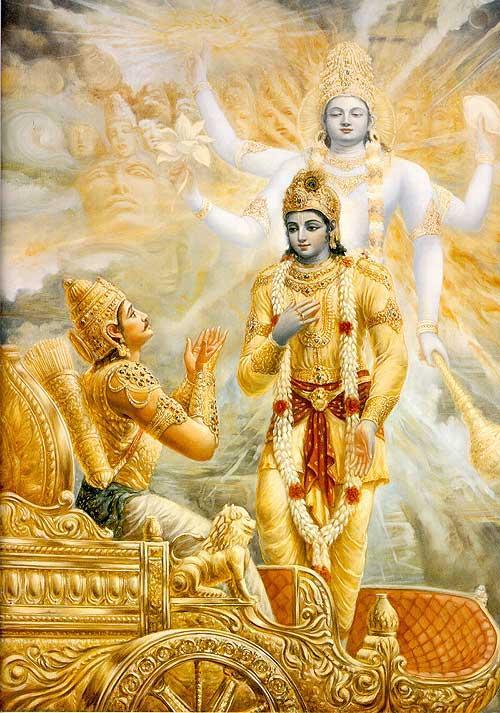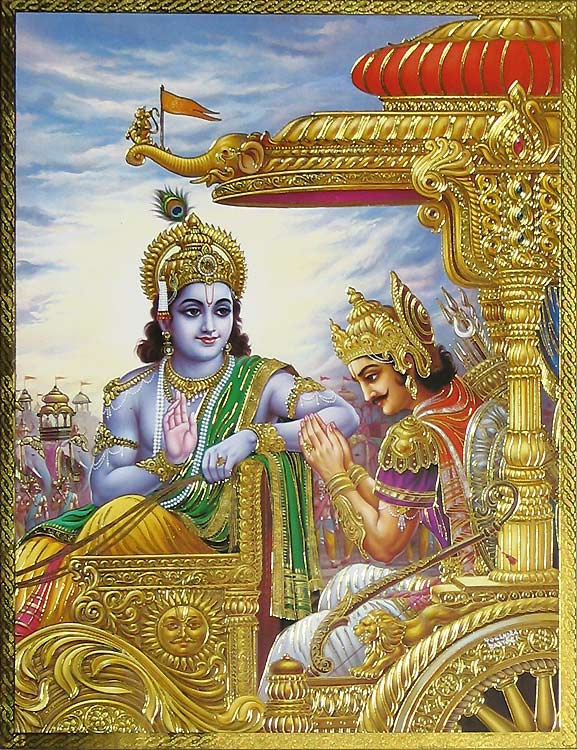Published from “Three Minutes” series written by A.S.Rajagopalan Swami of Ohio.
 janma karma ca me divyam
janma karma ca me divyam
evam yo vetti tattvataH |
tyaktvA dehaM punar janma
naiti mAm eti so’rjuna ||
(lord KR^iShNa, bhagavad gItA 4-9)
arjuna – oh, arjuna
me janma – My birth
ca me karma – and My actions
divyam – (are) divine;
evam – And so,
ya vetti tattvatah – Who realizes (this)
reality
tyaktvA deham – (when) sheds (his)
body
sa na puna: janma – he (is) not born
again
eti mAm – (but) reaches out and comes
to me
Lord KR^iShNa reveals the truth of His descent to Earth (avatAra rahasyam). In this 4th chapter of bhagavad gItA, He says that though He is birthless, He appears from age to age. Whenever there is a decline to righteousness and harm to good people, He makes Himself to be born. This particular verse translates to – “arjuna, one who knows the mystical nature of my appearance and activities, is not reborn again on leaving his body, but attains mokSham, my eternal abode”.
shrIman nArAyaNa is all powerful (sarva shaktan), supreme (paramam), the final Lord (brahmam), and is beyond birth / death (samsAra) or accumulated deeds (karma). avatAra-s like rAma and kR^iShNa are all simply His enactments (lIlA-s) to help and protect the good (siShTa paripAlanam) and eliminate the bad ones (duShTa nirgraham). One may doubt, if the Lord is all powerful, why does He need to descend from shrIvaikuNTham to perform such actions? There are two reasons for this as AcArya-s point out. 1. The Lord is brimming with love and compassion; He is like a father who instinctively dives into the well to rescue His child 2. He wants to give Himself for His devotee’s enjoyment. AzhvAr cries out, “Please come down one day, so that I can see you ” ( oru nAL kANa vArAyE). When he comes down as rAma and kR^iShNa, His devotees can touch, play, send as a messenger (pANDava dUtan), and ask Him to drive the chariot (pArthasArathi) etc. He displays noble qualities (kalyANa guNa-s) so that people can chant His name and have an opportunity to wipe out all sins. He wants to re-establish righteousness (dharma) and eliminate the evils.
Thus, the Lord assumes plant, animal and human forms. His body is divine (divyam) and not made of material stuff like other cetana-s (individual soul). His birth is immortal/flawless and is beyond prakR^iti (gross universal matter), and the triguNa-s (three basic characters) – sattva, rajas, tamas (purity, passion and inertia). Similarly, His actions are also divine. svAmi ALavandAr questions “Who has the character that is full of pristine purity” ( parama sattva samAshraya ka:) and answers that it is only shrIman nArAyaNa and none other.” Realizing this truth about Lord’s descent may not be easy, but, if one believes such knowledge whole-heartedly and without any doubt, one is able to escape the relentless birth-death cycle.
In essence, understanding this truth will burn away all sins, which serve as the basic hurdles for the bhakti or prapatti yoga. The cetana will meditate on the Lord, will be interested only about Him, and will thus finally reach Him. We all talk about avatAra-s casually, but we rarely realize that Lord makes all this only for us. svAmi deshikan notes, ” Greatness of Him is that to grant no- birth status to us, He himself is born here” ( piRavAmai tandiDa tAnE piRakkum perumaigaLum). King dasharatha did not get mokSham because he didn’t realize that shI rAma is Ishvaran. However, dadhi pANDavan did and he got salvation. He gave a place in his clay pot for KR^iShNa to hide from His mother, but when KR^iShNa wanted to come out, dadhi pANDavan didn’t open the pot but demanded mokSham, realizing that KR^iShNa is the Lord Himself. He got mokSham in that birth itself. These examples serve to instill bhakti and realization in our heart, not to put down others’ shortcomings.
Lord’s secrets of descent can be summarized through a mnemonic – PRINCE as nammaazvaar describes Him as “Prince in the sky” ( vAnil iLavarasu ).
The Lord descends down –
P – (to) Protect good people
R – (and to) Resurrect the shAstra
I – (but takes a form that is) Immortal
N – (it is real and) Not fake
C – (and is) Complete with all noble qualities
E – (and established only because of) Ego (sa~nkalpam).
What we learn from here –
1. Lord makes numerous attempts to rescue us, but we are missing His cues.
2. He has more vested interest. We are His lost items and He tries hard to get them back. A tamizh proverb says, “While the owned has one dip, the owner takes nine dips ( uDamaikku oru muzhukku. uDaiyavanukku onbadu muzhukku).
3. Lord’s divine stories are mesmerizing. One should enjoy hearing them and spend time contemplating about them.
4. Respect everyone despite their status. Lord uses various examples and people to teach lessons for the world.
He who knows Him, goes there He who has lost, lasts ever here









